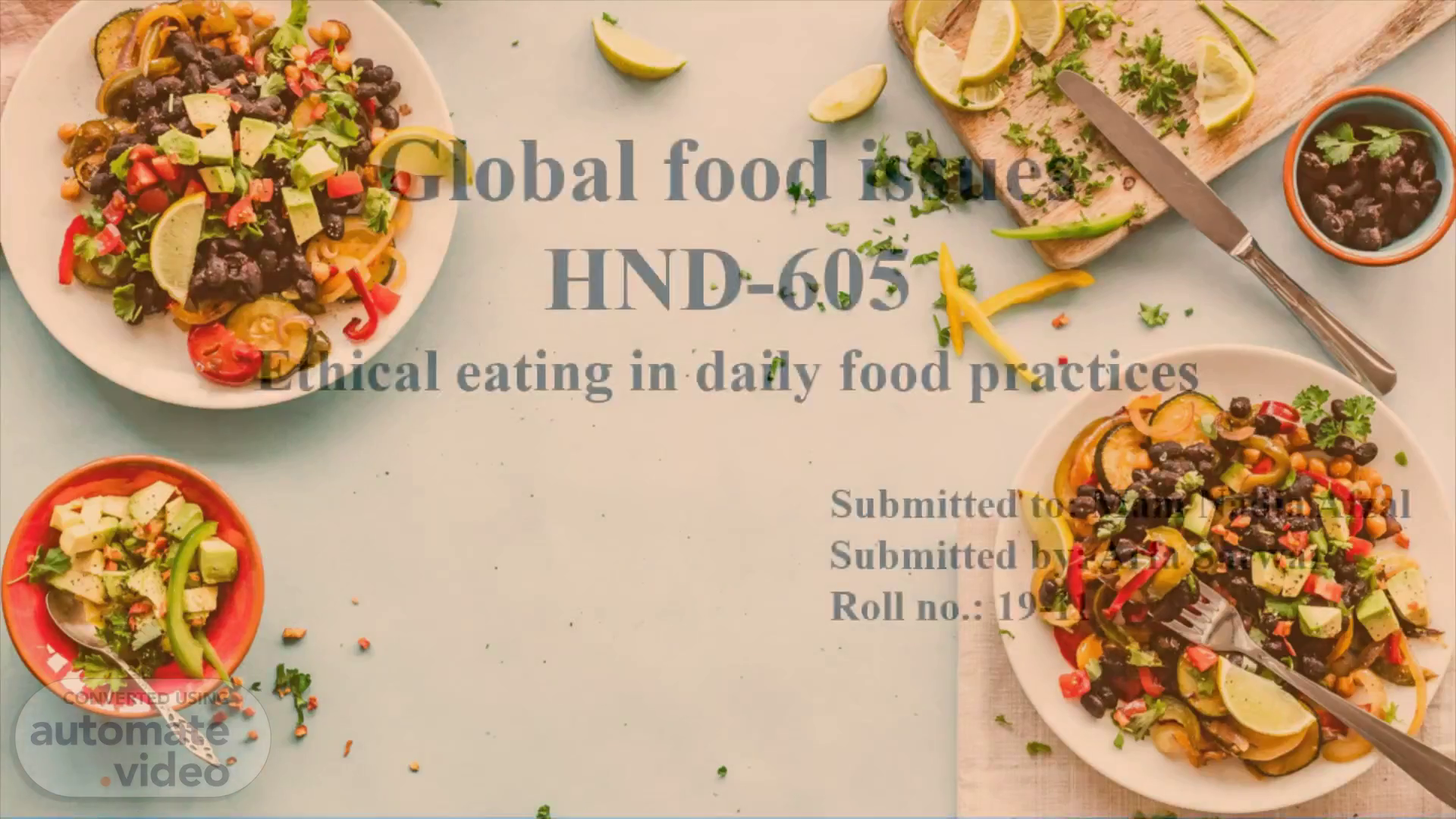
PowerPoint Presentation
Scene 1 (0s)
Global food issues HND-605 Ethical eating in daily food practices Submitted to: Mam Nadia Afzal Submitted by: Arfa Sarwar Roll no.: 19-11.
Scene 2 (0s)
Ethical eating in daily food practices. Ethical eating or food ethics refers to the moral consequences of food choices, both those made humans and animals. Common concerns are to damage to the environment, exploitive labor practices, food storages for others, inhumane treatment of food animals, and the unintended effects of food polices..
Scene 3 (1s)
3. Some simple ways to make ethical food choices include: Fair trade Buying from local farmers Learning to preserve foods Increase your plants and limiting your meat consumption Buying organic, non-GMO produce and grains Unprocessed and minimally processed foods Ethical food consumption reduces poverty by limiting support for food companies that do not prioritize human rights or environmental sustainability. With proper knowledge and motivation, people can adopt a wide range of healthy, affordable, ethical and sustainable food practices..
Scene 4 (1s)
Main areas in food ethics:. 1.Food security: (food for all).
Scene 5 (2s)
5. Food ethics and time. The past: Food ethics stretches backwards. Towards the living nature that the food comes from and towards the production practices under which the food has been produced. Present: decisions, choices The future: food ethics stretches forwards. Towards the future consumers of the food..
Scene 6 (2s)
6. Situating food ethics in everyday life. The common meal ( family, friends, community, network, business, religious ceremonies etc.) Shopping food and cooking. Catering outlets.
Scene 7 (3s)
7. Food communicating ethics. Convenience Health and well-being Culture and traditions Food security service.
Scene 8 (3s)
Main issues to considered. Ethical production: This covers the way that your food is produced. For example, Do your meat, eggs and dairy products come from farms that are following agreed standards of animals welfare? Are you buying fair trade goods to ensures that producers in developing countries receive a ‘fair’ wage for their work? Can you track your food back to its source?.
Scene 9 (4s)
There are huge number of questions here, and the answers are not necessarily black and white. For example: Is use of fertilizer is good or bad? It is good because it means that farmers can produce more food from the same acreage, so feeding more people with less. However, it is bad if it pollutes water courses. Are genetically modified crops good or bad? They are surely good if they enable farmers to produce more food with fewer pesticides and herbicides, but what if the modified genes get into other plants. These questions, and many others, can only be answered by debates and discussions that draws on scientific evidences. However, we must also recognize that individual ‘red lines’ may be drawn in different places; there are no ’right answers’..
Scene 10 (4s)
Fair consumption: The issue of fair consumption rests on the idea that we should only consumes our ‘fair share’ of the world’s resources. This means being aware of the ‘cost’ (that is, to the planet and the community) of producing food, and if necessary, reducing our consumption of certain products to avoid excessive consumption..
Scene 11 (5s)
11. Ethical foods address consumer concerns about food quality and safety.
Scene 12 (5s)
12. It is striking that so many men and women of all ages are factoring ethical concerns into food purchase decisions. As can be expected, there are some differences in analyzing results by gender and by age. In both cases, while differences are statistically significant, with just a few exceptions they often are not large..
Scene 13 (6s)
13. Women are more concerned about certain ethical issues.
Scene 14 (7s)
14. Age differences. In a few areas, differences based on age are more pronounced than those by gender Younger adults report stronger beliefs regarding ethical foods than their older counterparts and are more likely to act on those beliefs. Again, it should be noted that women in younger age groups often more likely than men to express ethical food concerns, especially with regard to many altruistic issues..
Scene 15 (8s)
15. References. http://www.skillsyouneed.com/ps/ethical-food-consumption.htm http://impactful.ninja/make-ethical-food -choices/ http://borgenproject.org/ethical-food-consumption/ http://slideplayer.com/slide/6933493/ http://www.slideshare.net/trufflemedia/ethical-food.
Scene 16 (12s)
16. Thank You.